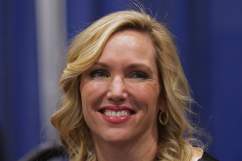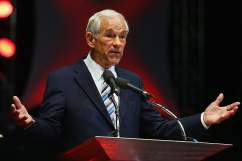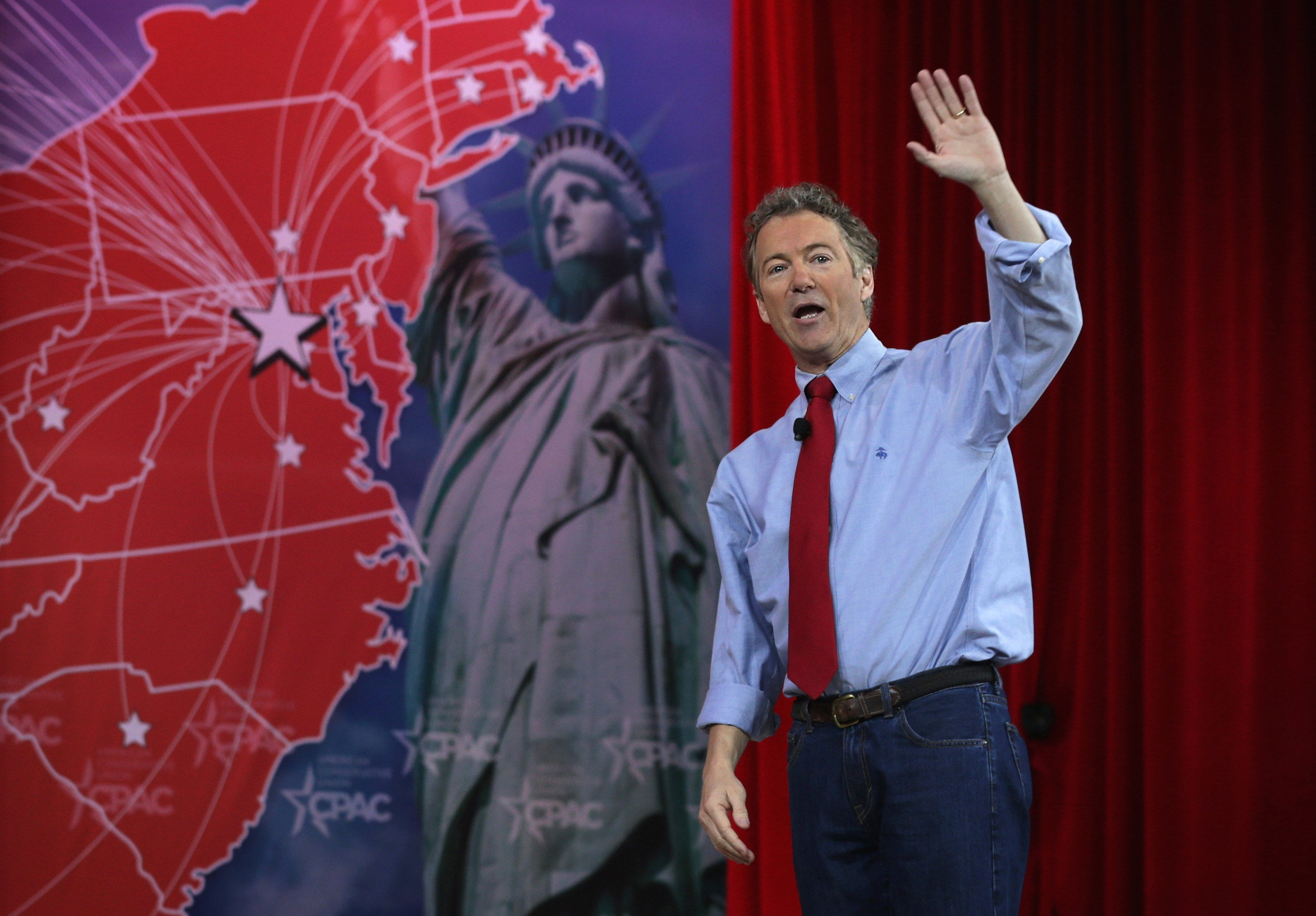
U.S. Sen. Rand Paul (R-KY) waves to the crowd after he addressed the 42nd annual Conservative Political Action Conference (CPAC) February 27, 2015 in National Harbor, Maryland. (Getty)
As Republican Sen. Rand Paul announces he will be running for president it appears he has drifted somewhat from the Libertarian ideas that made him more unique than many of his conservative counterparts.
While Ron Paul, Rand’s father, has long been one of the country’s most prominent libertarians, Rand has often admitted that his beliefs are only somewhat influenced by libertarainism. He said at a Harvard event last year that he wants to bring a libertarian influence to the Republican party.
Nick Gillespie, editor of the libertarian magazine Reason, told the Washington Post recently about Rand Paul:
To the extent he sounds more like every conservative Republican, he sounds less interesting to libertarians. I don’t see what he picks up by being a version of Ted Cruz or Marco Rubio. He’s not a doctrinaire libertarian. He’s libertarian-ish. He’s not his father.
Here’s what you need to know about Rand Paul and libertarianism:
1. He’s Trying to Reach a Broader Audience
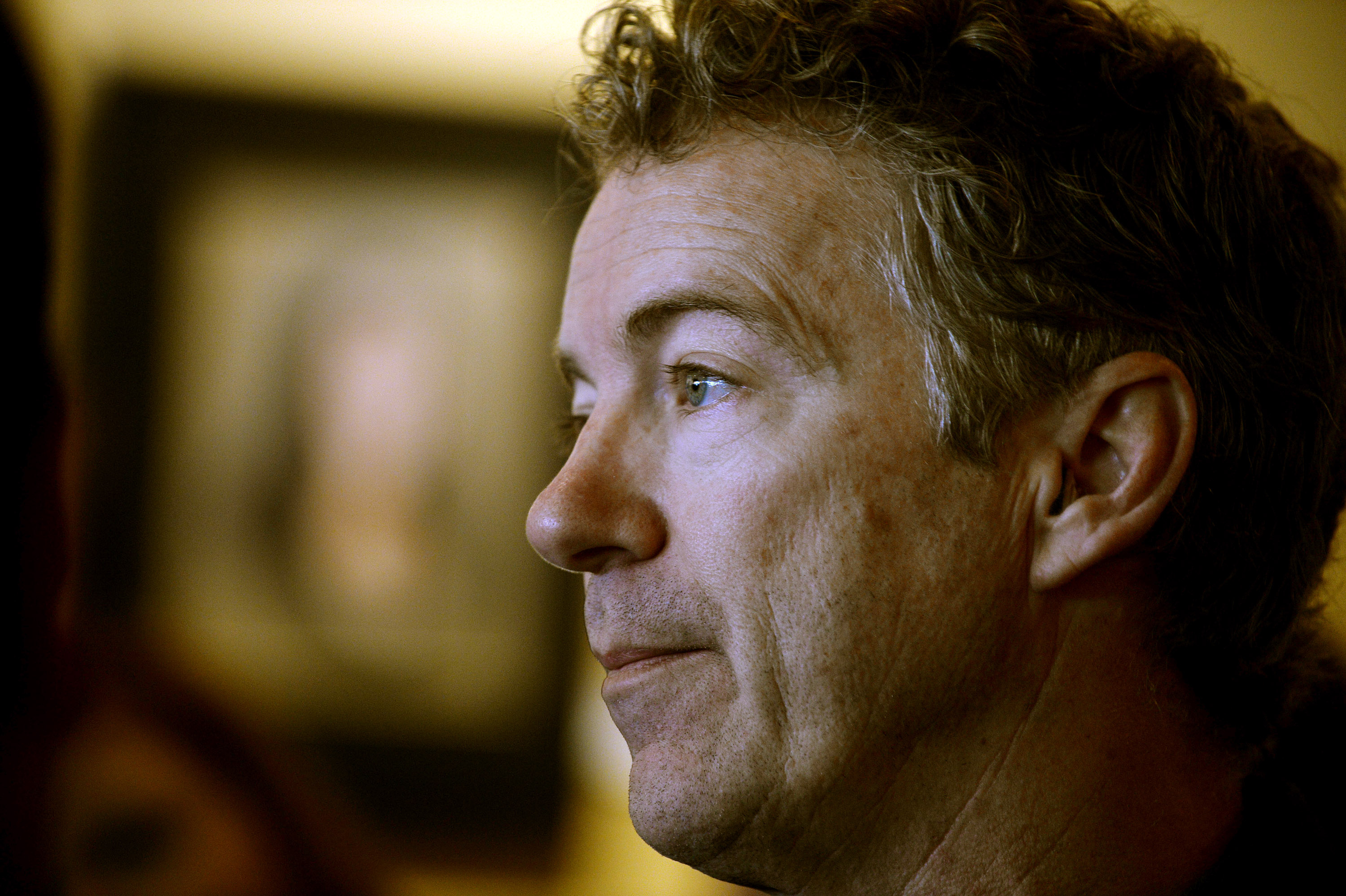
(Getty)
As Rand Paul neared his decision to run for president, his libertarian views became more cloudy. As the Washington Post notes, Paul began to try to reach out to a broader voter pool in the Republican party by taking a stronger stance on defense and foreign policy and by reaching out to the religious right by cementing his views on gay marriage, abortion and other social issues.
Drew Ivers, who was Ron Paul’s campaign chairman in Iowa in 2012, told the Washington Post about the younger Paul:
Rand has made it clear that his strategy is to embrace a broader group of Republicans than his dad captured. Whether he can pull it off has yet to be proven, and he has significant challenges, even though he’s a smart guy and capable.
The question is mathematics: How many people will he gain versus how many will he lose, both in terms of numbers and energy? I’d prefer if he had a different strategy, reaching out his arms to the center-right and saying ‘join me,’ rather than meeting them in the middle.
2. Ron Paul Isn’t Likely to be a Key Part in His Son’s Campaign
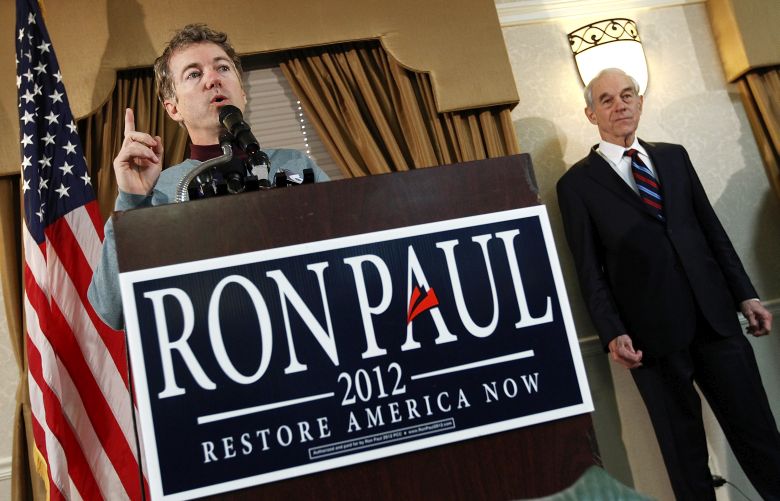
Rand Paul speaking on his father’s behalf during 2012 Presidential elections. (Getty)
According to the New York Times, Ron Paul isn’t expected to play a major role in Rand’s campaign. But the elder Paul will be at the Lousiville kickoff of Rand’s campaign, according to the Times, as he is flying on a chartered plane from Minnesota, where he gave a talk Monday night. Many of Ron Paul’s supporters could take his appearance at his son’s side as somewhat of a reassurance that he hasn’t forgotten his libertarian roots.
But Brian Doherty, of Reason magazine, sad Ron Paul could be trouble for Rand as he tries to reach out to the Republican base. Doherty told the Times:
Ron Paul is a bomb waiting to go off. It would be silly to do this dual campaign thing, and I think they know it. Ron is going to say things that Rand is not going to want to stand behind.
But Ron Paul’s name could be important to Rand as he begins his campaign, especially in Iowa. David Fischer, the co-chairman of Ron Paul’s 2008 and 2012 Iowa campaigns and a former chairman of the Iowa GOP, told Politico:
I’m excited about the prospect of Senator Paul running for president and look forward to his visit to Iowa on April 10. If, as expected, he launches his presidential campaign I will be proud to stand with Rand, who I believe stands head and shoulders above the other prospects in terms of electability and commitment to our cherished principles of freedom and prosperity. I’ve talked to hundreds of people who supported Ron Paul and the vast majority of them are ready to stand with Rand.
3. Many Libertarians Disagree With His More Socially Conservative Ideals
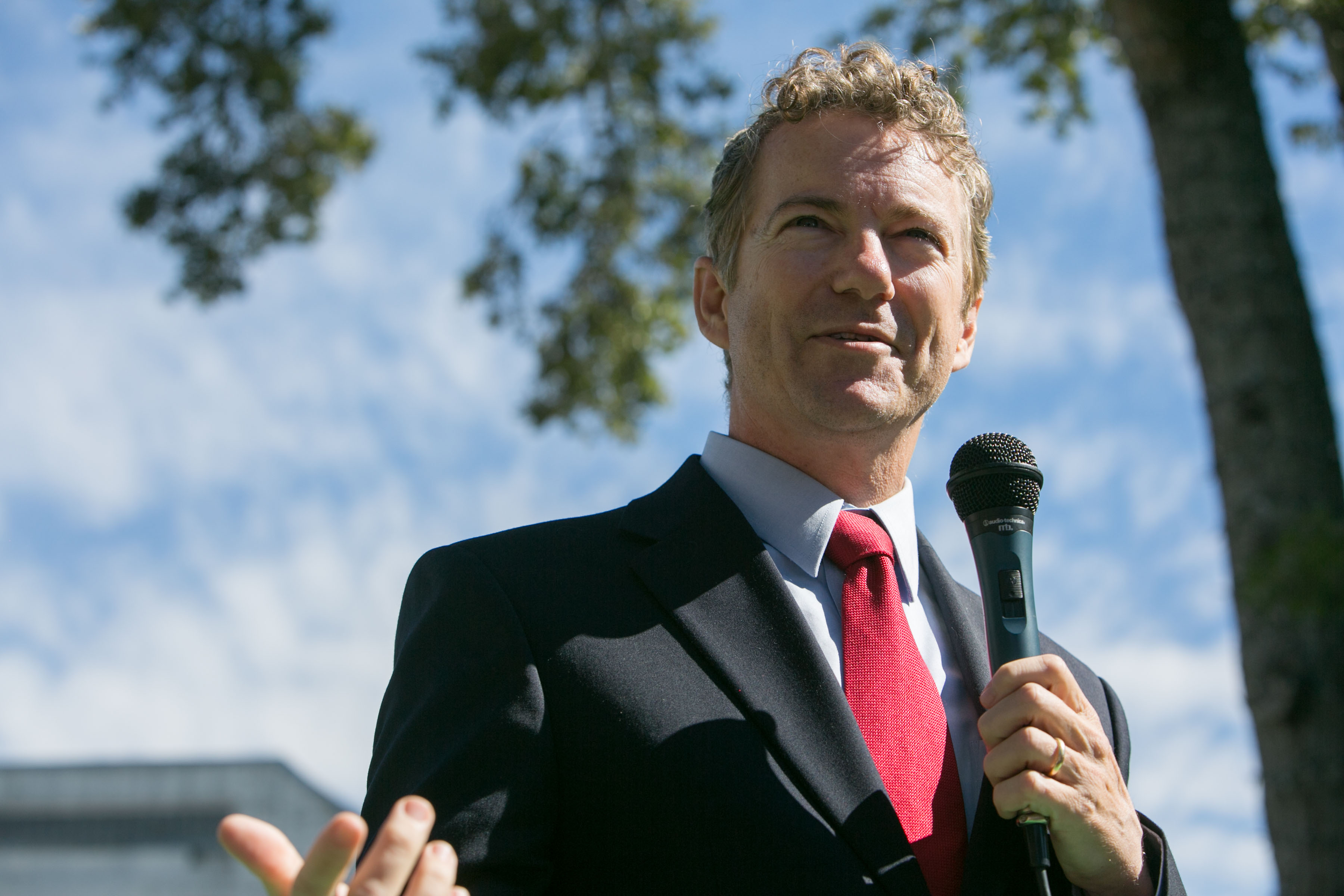
(Getty)
Rand Paul differs from libertarians in his socially conservative views. Libertarians, like Rand’s father, are known for being fiscally conservative while more socially liberal.
But Rand Paul has sponsored legislation that would make abortions illegal and opposes same-sex marriage (and has called it offensive). He does not support the legalization of marijuana, which Reason said is not “remotely libertarian.”
He also supports increasing defense spending and has supported the use of drones.
4. His Libertarian Credibility Could Be Key to Securing Younger Voters
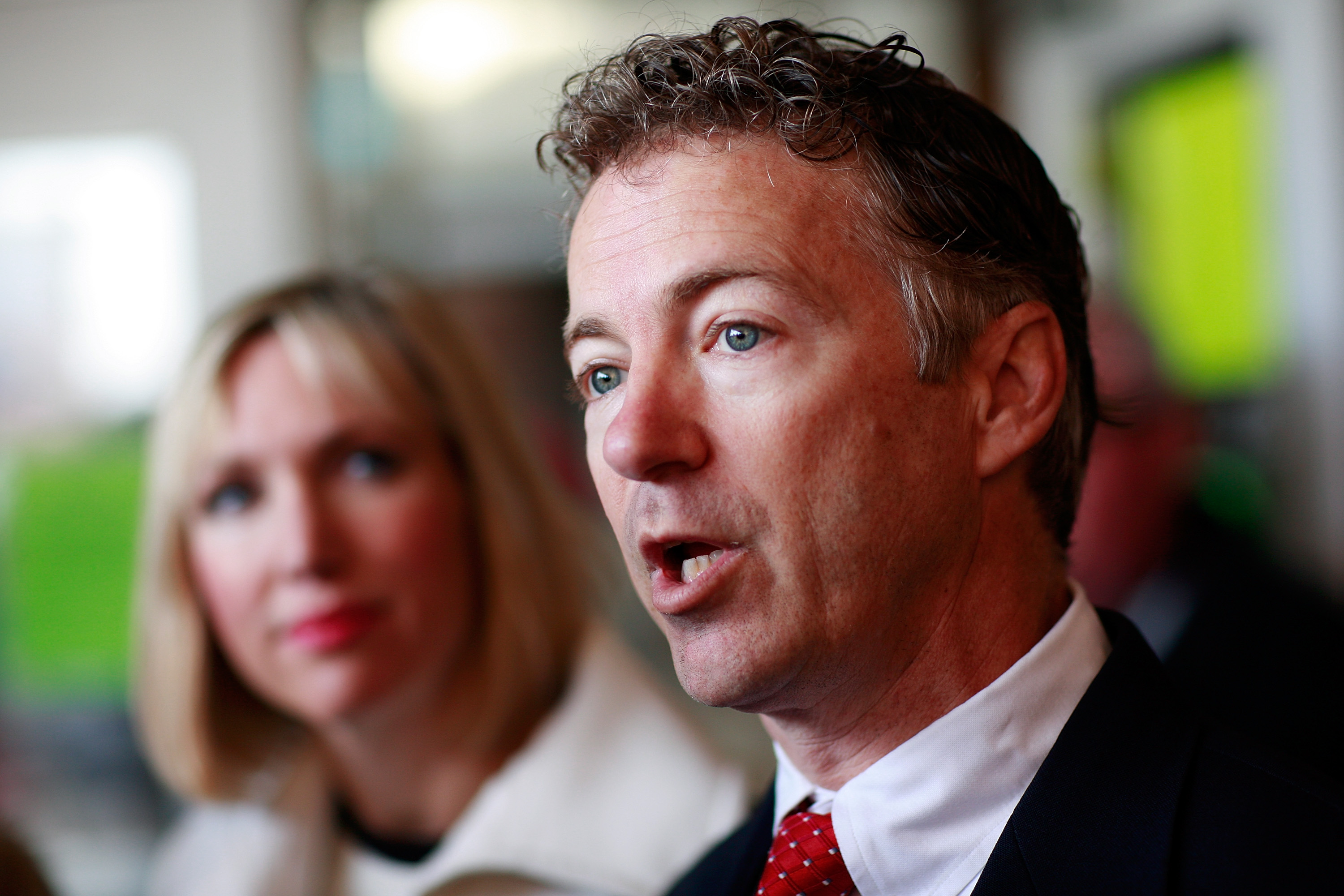
(Getty)
Establishing himself as “libertarianish” could help him secure younger voters who may be looking for a candidate who stands out in a crowded Republican field.
In 2012, Ron Paul had the highest number of votes among Iowans under 45, according to the Philadelphia Inquirer. And Rand Paul could hope for the support of groups like the Young Americans for Liberty, led by college students, which has supported Ron Paul in the past.
5. He May Not Be a His Father, But He’s More Libertarian Than Other Candidates

(Getty)
While Rand Paul may not share all of his father’s beliefs, and may be shying away from them, libertarians still say he has more of those values than his opponents.
David Boaz, executive director of the Cato Institute and author of The Libertarian Mind: A Manifesto For Freedom, wrote in an article for Newsweek:
Paul doesn’t claim to be a libertarian, and he takes positions that many libertarians disagree with. But on a broad range of issues, from spending and regulation to government spying, drug wars and military intervention, he has a more libertarian policy agenda than any major candidate in memory.
That will garner him the lion’s share of his father’s supporters, who among other things donated $40 million in small contributions to the 2012 campaign. And if he can present himself as a plausible president, he has the potential to rally a much larger group of libertarian-leaning voters who have never been appealed to so directly before, voters who are skeptical about tax-and-spend government, mass surveillance and unnecessary wars.

